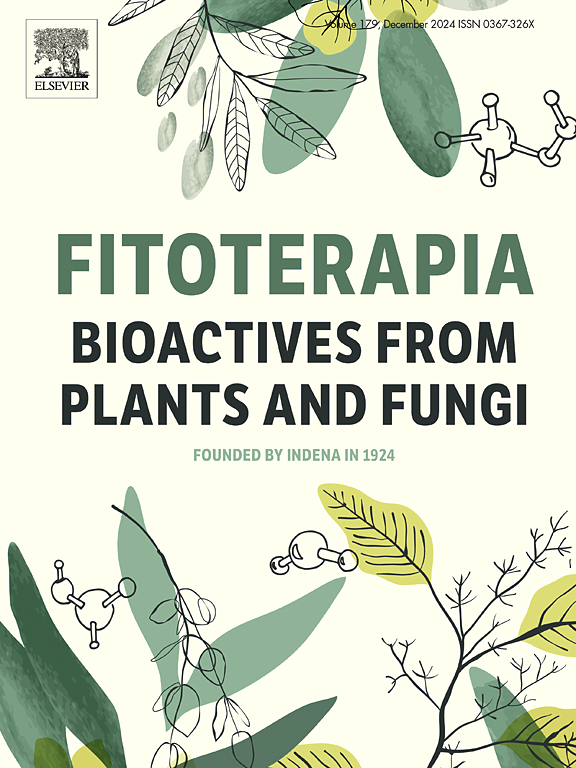Controlled fermentation of Arisaema cum bile with isolated Fungi strains and its antipyretic effects in a febrile mouse model
IF 2.5
3区 医学
Q3 CHEMISTRY, MEDICINAL
引用次数: 0
Abstract
Arisaema cum Bile (DNX, Dan Nanxing) is a traditional fermented Chinese medicine renowned for its antipyretic properties. Conventionally, DNX is produced through natural fermentation using indigenous microbial strains, which often results in an unstable microbial composition and susceptibility to contamination by harmful microorganisms. Additionally, inconsistencies in the fermentation process and outdated quality control methods further compromise the quality and safety of the final product. This study aimed to investigate the production of DNX using isolated fungal combinations under controlled conditions. Based on separation and high-throughput sequencing analyses, four dominant fungi were selected for restricted fermentation. When inoculated at a ratio of 1:1:2:2, the amylase activity of DNX reached its peak, with fermentation endpoints determined by both amylase activity and changes in calcium oxalate crystal structure. Metabolomic analysis revealed that among the top 30 compounds with the highest content, 24 exhibited consistent relative content changes between restricted fermentation and natural fermentation. In febrile mice, DNX produced by both fermentation methods demonstrated comparable antipyretic effects, significantly reducing body temperature and inflammatory cytokines (p < 0.05), including IL-6 and TNF-α, to normal levels. Furthermore, inflammation-related signaling pathways, such as cAMP and PGE2 levels, were significantly downregulated following DNX treatment (p < 0.01). These findings suggest that DNX produced through restricted fermentation exhibits therapeutic effects comparable to those achieved by natural fermentation. This study proposes a novel fermentation strategy for the industrial production of DNX, offering improved consistency and quality control.
分离菌种对胆沙蒿的控制发酵及其对发热小鼠模型的解热作用
丹南星是一种传统的发酵中药,以其解热特性而闻名。传统上,DNX是通过使用本地微生物菌株自然发酵产生的,这往往导致微生物组成不稳定,容易受到有害微生物的污染。此外,发酵过程中的不一致和过时的质量控制方法进一步损害了最终产品的质量和安全。本研究旨在研究在控制条件下利用分离真菌组合生产DNX。基于分离和高通量测序分析,选择4种优势真菌进行限制发酵。当接种比例为1:1:2:2时,DNX的淀粉酶活性达到峰值,发酵终点由淀粉酶活性和草酸钙晶体结构的变化共同决定。代谢组学分析显示,在含量最高的前30个化合物中,有24个化合物在限制发酵和自然发酵之间表现出一致的相对含量变化。在发热小鼠中,两种发酵方法产生的DNX表现出相当的解热作用,显著降低体温和炎症细胞因子(p <;0.05),包括IL-6和TNF-α降至正常水平。此外,炎症相关的信号通路,如cAMP和PGE2水平,在DNX治疗后显著下调(p <;0.01)。这些发现表明,通过限制发酵产生的DNX具有与自然发酵相当的治疗效果。本研究提出了一种新的发酵策略,用于工业生产DNX,提高了一致性和质量控制。
本文章由计算机程序翻译,如有差异,请以英文原文为准。
求助全文
约1分钟内获得全文
求助全文
来源期刊

Fitoterapia
医学-药学
CiteScore
5.80
自引率
2.90%
发文量
198
审稿时长
1.5 months
期刊介绍:
Fitoterapia is a Journal dedicated to medicinal plants and to bioactive natural products of plant origin. It publishes original contributions in seven major areas:
1. Characterization of active ingredients of medicinal plants
2. Development of standardization method for bioactive plant extracts and natural products
3. Identification of bioactivity in plant extracts
4. Identification of targets and mechanism of activity of plant extracts
5. Production and genomic characterization of medicinal plants biomass
6. Chemistry and biochemistry of bioactive natural products of plant origin
7. Critical reviews of the historical, clinical and legal status of medicinal plants, and accounts on topical issues.
 求助内容:
求助内容: 应助结果提醒方式:
应助结果提醒方式:


